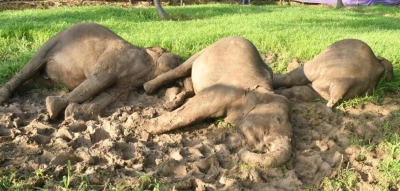Chennai: Three female elephants were electrocuted to death in the early hours of March 7 in Kali Kotta Gounder village in Tamil Nadu’s Dharmapuri district. Two calves aged less than 9 months were seen near the motionless bodies of the elephants.
The forest department found that the elephants died after they came in contact with an illegal electric fence erected by a farmer to protect his crops from the attack of wild boars and elephants.
The farmer, Murugan (48) was arrested and remanded to judicial custody. The Tamil Nadu forest department immediately announced that those farmers who have erected illegal electric fences leading to the death of elephants and wild animals, would be charged under the Goonda Act.
These electric fences are erected illegally and without any technical competence leading to high voltage being passed through these fences. Instead of controlled electricity being passed through these fences, which act as a deterrent to the wild animals to enter the farm land, illegal fencing leads to high-voltage being passed through these fences leading to the death of the animals.
Another issue is the failure of the Tamil Nadu Generation and Distribution Corporation (Tangedco) to clearly monitor the electric lines passing through the areas adjacent to forest lands and to check whether illegal connections are taken for electric fences. After the tragic incident of three female elephants electrocuted in Dharmapuri district, the Tangedco officials have commenced a monitoring and tracking of electric lines passing adjacent to the forest lines.
The human-animal conflict, especially the conflict with the elephants are on an increase in districts like The Nilgiris, Dharmapuri and Krishnagiri districts with the farmers complaining of attacks by wild elephants and at least a farmer getting killed in an average of one a week.
The state forest department along with the Tamil Nadu Police have commenced an awareness among the farmers and local people not to venture into the forest areas during dusk and at early morning hours.
The elephants have been attacking people and killing them while they were either relieving themselves in the areas close to the forest land and people have been warned by the department to be clear in the presence of wild animals, especially elephants.
R. Ananthakrishnan, scientist and wildlife researcher based out of Dharmapuri, while speaking to IANS said, “Elephants venture into human settlements mostly in search of food and water. With depleting water resources, the elephants reach human settlements. Also, elephants are fond of eating rice, jack fruits, and other edibles, including jaggery.
“People have to be cautious in living close to the forest border and elephants will come in search of food again and again. The forest department must ensure that water resources are not depleted in the forest land and try to cultivate jack fruits and other fruits in the forest land so that elephants are confined in their habitats.”
He also said that the encroachment of forest land as well as settling in the elephant pathways are the two main reasons behind the elephants venturing into human settlements and entering into conflicts with men leading to the death of people. The emeritus scientist said that instead of the elephants venturing into human settlements, it was the other way around.
The shrinking habitats have been the main issue of the elephants reaching the human settlements leading to direct conflicts and killings as well as destruction of properties and crops by the pachyderms.
Another sad part is the elephants losing their lives after being hit by moving trains. In the Kanjikode-Madukkarai railway track, two railway track lines, A and B pass through forest land. Seven elephants were killed in 2016 after being hit by moving trains.
Sign boards to warn loco pilots, clearance of vegetation on the sides of the track, speed restriction on vulnerable sections (65 kmph during day time and 45 kmph during night time), elephant ramps on high embankments, lights to ward off elephants and installation of radio alarms in the form of a honey bee buzzing are the steps taken by the forest department to prevent elephants getting killed after being hit by moving trains.
Officials of the Palakkad division of the Southern Railway, which is managing the Kanjikode-Madukkarai track also said that WhatsApp group of Railways and Forest Department officials is also another measure taken to reduce the elephants being hit by moving trains.
With the human-elephant conflict increasing and several people and elephants also getting killed due to several reasons, efforts are being taken by the Tamil Nadu forest department to prevent this. Regular awareness is created among the people living close to the forest borders to reduce the impact of human-animal conflict and stringent measures taken to prevent elephants being electrocuted or hit by trains are also taken.
–IANS


Comments are closed.